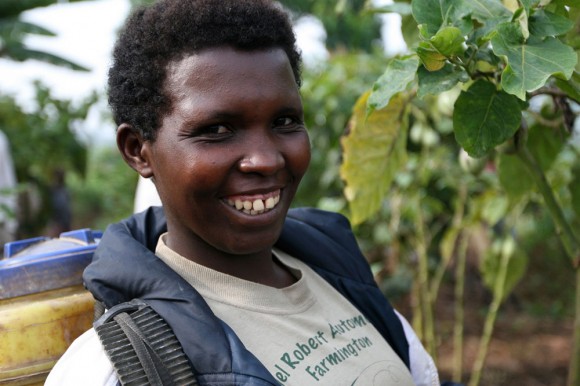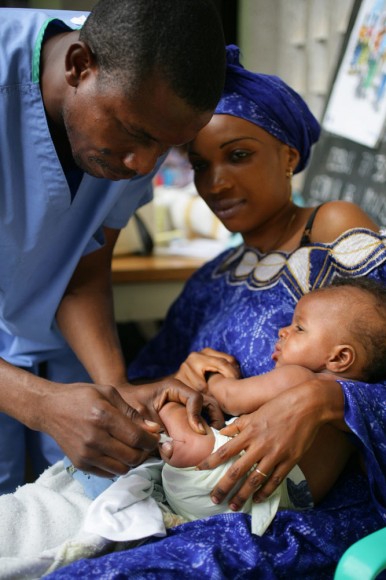At a time of national austerity and global alarm, sources of pride and international affection for Britain are particularly valuable. Earlier this month ordinary British people took pride in the Queen’s Diamond Jubilee, and this was matched by a global outpouring of affection and enthusiasm. Next month we will host the Olympics, thanks to the world’s choice of Britain as the preferred venue. Britain’s aid programme is also a legitimate basis for pride and affection: whereas other rich nations are proving to be fair-weather friends of the poorest countries, Britain is rising to the challenge of fighting global poverty.
But generosity at a time of austerity demands the tough decisions that achieve effectiveness. I have been impressed that the Department for International Development (DFID) is now acutely conscious of value for money. This is reflected in the big decisions to concentrate our aid on those countries that are most in need, closing down programmes in middle-income countries that are now in a position to help themselves. Helping to transform the poorest countries is often difficult, but it is most surely now the key challenge for aid.

An outstanding example of Britain’s aid success in such environments has been our programmes in Rwanda. Objective, independently analysed household survey data has now demonstrated that over the last five years a million Rwandans – one in five of those who were poor - have been lifted out of poverty. This rate of poverty reduction is the fastest ever achieved in Africa and equals the best achieved globally. Britain’s major aid programme to the country has been central to that success and has been greatly appreciated. Yet Rwanda’s success was far from inevitable: less than two decades ago it was the world’s worst social conflict catastrophe, and being landlocked and over-populated had few opportunities. It could easily have become a festering sore for international concern. Instead, it is now contributing to regional prosperity: British companies are looking to it as a haven for investment in Eastern Africa.

The concern for value for money is also reflected in the much greater emphasis upon evidence of effectiveness: calibrating success by what has been achieved rather than by how much has been spent. Sometimes this is straightforward, as with tracking the number of children who have been vaccinated thanks to our money. Sometimes hard evidence is more elusive but the payoff can be huge.
Last month I was in Burma, working with the local DFID team, and as I write my colleagues are on a plane to Malawi. Both countries are remarkable new openings for political and economic reform which need urgent support. If Burma succeeds in a peaceful transition from repression and poverty to an open and prosperous society it will benefit not only the Burmese but the British. Historic ties make Burma a natural trading partner. Six months ago Malawi looked to be on course for disaster, with Britain’s aid programme quite rightly closed down. Now a courageous new President has personally reached out for our help. Her first decision has been to sell the presidential jet!
British aid is now a sensible balance between the sure payoffs like vaccines and bed nets, and the ‘venture capital’ expenditures like independent policy advice. We can be certain that millions of the world’s poorest people will live better and longer lives thanks to our taxes spent on the sure pay-offs. We can be realistically hopeful, that DFID’s work in countries such as Burma and Malawi will reduce global risks, helping to turn them from nightmares such as Rwanda used to be, to prospering and valued partners in globally troubled times.
This blog is written in response to the release of DFID's annual report and the results UK aid has achieved since a review of how British aid is spent was undertaken last year.
This is a guest blog. Views expressed here do not necessarily represent the views of the Department for International Development or have the support of the British Government.
UK aid is changing lives - see the results, share the stories and get involved on Facebook

8 comments
Comment by Ismail Ali posted on
At a time when capitalism, as a system, is under huge challenge, when vast number of people are increasingly disillusioned of its ineffectiveness, DFID's contribution in alleviating poverty through involving private sector reflect UK's determination that inclusive growth can be achieved utilizing market forces. Simply providing aid to tackle the problem of global poverty proved wrong in the past decades, I believe.
DFID's contribution not only influence UK's reputation world-wide but it has made real contribution for millions of people starving in many places in the world. It is my sincere belief that billions of pounds UK tax payers contributing as aid is not like "Poor people in rich countries are giving money to rich people in poor countries", as many expert opined.
Comment by Ived Amos posted on
Would like to know what DFID is also doing to avoid aid dependency, because that is really key. Some countries become the 'darlings' of the donors, but without strengthening the country's own institutions donor money can just be a mere handout.
Comment by Michael Alexander posted on
Giving Aid to Rwanda sums up almost everything that is wrong with DfID. Firstly the UK is running a massive deficit and every pound sent anywhere as 'foreign aid' is borrowed - our children and grandchildren will be paying tax to fund the interest on this profligacy; secondly Rwanda is a country the UK has no historical ties with and is in no way responsible for the well-documented genocide; thirdly many respected commentators (including within the UN) state that the Rwanda Government (despite official denials) is supporting m23 rebels in neighbouring countries; fourthly giving aid directly reduces the standard of living and services provided to poor and old people in the UK. To resuse the words of the artcicle: because of the billions of pounds for 'foreign aid' being taken from the pockets of British taxpayers every year we can be sure that millions of Britain's poorest people will live diminished and shorter lives thanks to the immoral system that promotes and delivers 'foreign aid'.
Comment by Ismail Ali posted on
It would be great if I would have information like this from the department of DFID. Thank you.
Kind regard
Ismail Ali
Comment by BlogModerator posted on
Hi Ismail Ali and Ived Amos, please refer the following news story on the DFID websiet and the ActionAid report linked from it - http://www.dfid.gov.uk/News/Latest-news/2011/Real-aid-from-UK-helps-to-end-poverty-for-good/
ActionAid have stated Britain is leading the way in providing quality aid that makes a real long term difference to ending poverty. 'Real aid' is helping countries to beat poverty for good, by gradually reducing reliance on foreign help and building up their own capabilities. The new report finds that poor countries' reliance on aid has declined by a third over the past decade and the UK is taking a global lead through high quality aid.
Comment by Michael Alexander posted on
Hi Ismail Ali and Ived Amos (and Blog Moderator) and as a balance which may interest you about how DfID and the UK nation borrowing money to give away as 'foreign aid' directly negatively affects the wellbeing of UK children see the following link from an internationally admired independent social body, the Rowntree Foundation
http://www.jrf.org.uk/work/workarea/child-poverty
Best
Comment by Michael Alexander posted on
Good news today is that the UK is suspending £16 million of aid following the fact that even DfID and the Foriegn Office could no longer ignore the (let's be polite) 'dodgy dealings' of the President and his elite - let us hope that it is a permanent suspension. The bad news I had been unaware of was that £32 million of DfID aid was simply poured into the Rwandan government coffers with no strings and no receipts required. Please DfID if you must continue to send British taxpayers money overseas at least do not send it to prop up authoritarian governments but try to get it if not to the people then to NGOS and projects that seem to be at least half honest.
Comment by Kane Prior posted on
Great read on British aid, I agree that with Rwanda, the aid is actually being spent really well, lifting many people out of poverty. I would like Britain to remain a leader in aid, as it has already taken a background role in so many other roles. Plus when you think total aid only really account for about half a percent of GDP, its not really that much.
I wrote a similar article on British aid recently, would be great to hear you view on it http://economicinterest.wordpress.com/2012/11/11/altruistic-britain/
Thanks